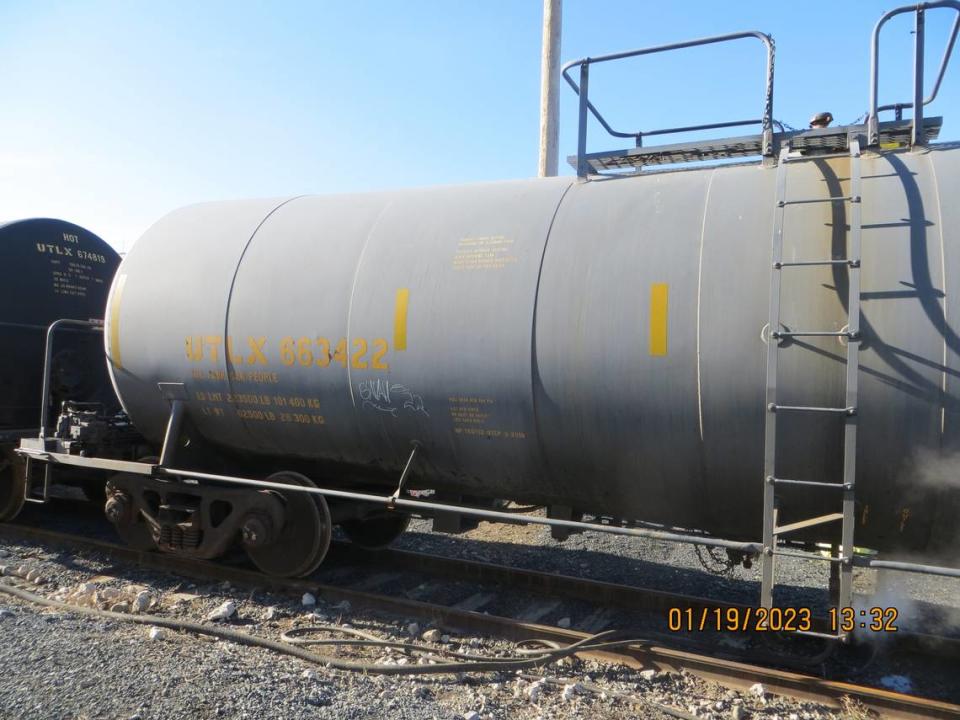Eastern WA chemical company fined $480K after worker exposed to toxic gas falls 12 feet
Two Rivers Terminal has been fined nearly $480,000 by the Washington state Department of Labor and Industries after a worker was seriously injured at its Moses Lake plant.
It is appealing the fine.
Two Rivers formulates chemical products for agricultural fertilizer, airports, pulp and paper plants, and water treatment. It has plants in Pasco and Umatilla, Ore., in addition to its Moses Lake, Wash., plant
During an investigation in January 2023 state inspectors found that a worker unloading molten sulfur from a railcar was not wearing proper respiratory protection, among other serious safety violations, according to L&I.
The worker was on top of a railcar when he was exposed to the toxic gas hydrogen sulfide and was overcome. He fell about 12 feet to the ground and sustained serious injuries, according to L&I.
The worker was not wearing a hydrogen sulfide gas monitor, appropriate respiratory protection or fall protection, according to L&I.
The worker had a full beard which would not have allowed a respirator to seal correctly, and it was not clear from state documents whether he was wearing a respirator or not.
Personal monitors for hydrogen sulfide and sulfur dioxide were not issued to workers until the day after the fall, according to L&I.
“It’s hard to overstate how serious a risk they were taking with their workers’ lives,” said Craig Blackwood, assistant director for L&I’s Divison of Occupational Safety and Health.
Company management told L&I that the process for unloading molten sulfur changed from unloading tank trucks to unloading railcars a few months before the worker fell and was injured.

No assessment of the dangers of the new process had been done, according to L&I.
The state agency stopped work on Jan. 26 at the area where molten sulfur was unloaded from the railcar.
Work was allowed to resume Feb. 6 after Two Rivers provided respirators to workers and made sure they fit and were used properly.
Ten days later L&I inspectors were back to check the area where railcars were unloaded and saw a worker loosening the bolts to a hatch on a molten sulfur railcar.
One inspector saw a plume of gas and heard a hiss of gas escaping from the hatch and then alarms from the employee’s hydrogen sulfide and sulfur dioxide monitor, according to L&I.
The inspector concluded that just loosening the bolts on the hatch allows toxic gas to escape, substantiating the violations found in the initial inspection, according to L&I.
The fine announced Thursday included $63,000 for each of seven violations the state categorized as both willful and serious, plus lesser amounts for seven violations it considered serious.
2022 Two Rivers Terminal fine
L&I also fined Two Rivers Terminal $192,620 in 2022, including for some hazards it was fined for again this year.
The 2022 find was issued after inspectors found violations of confined space entry rules as workers entered railcar hoppers, according to L&I.
The employees were going into the hoppers to break up and dislodge ammonium nitrate without appropriate safety precautions, it said.
Workers must have special training to enter and work in confined spaces and specific safety regulations must be followed.
Inspectors also found employees working on top of rail cars and sulfur trucks without fall protection. They also failed to make sure the power supply to dangerous equipment was turned off and “locked out” so machinery did not start unexpectedly.
It also found then that Two Rivers Terminal was not requiring employees to wear respirators while working with hazardous chemicals.
Two Rivers Terminal also is appealing that fine.
Appeal documents were not immediately available from the state, and an official with Two Rivers Terminal declined to comment on Thursday.

